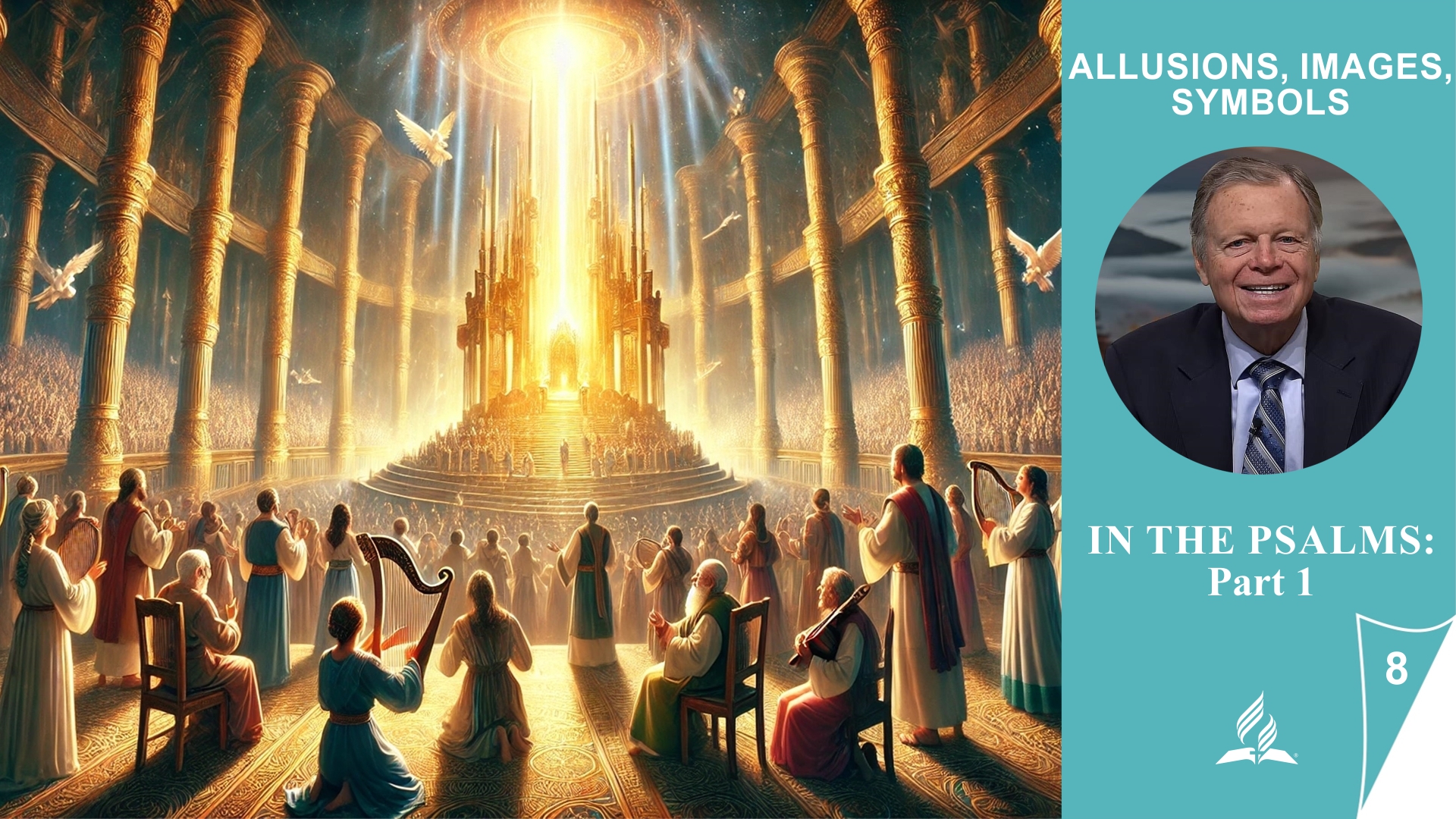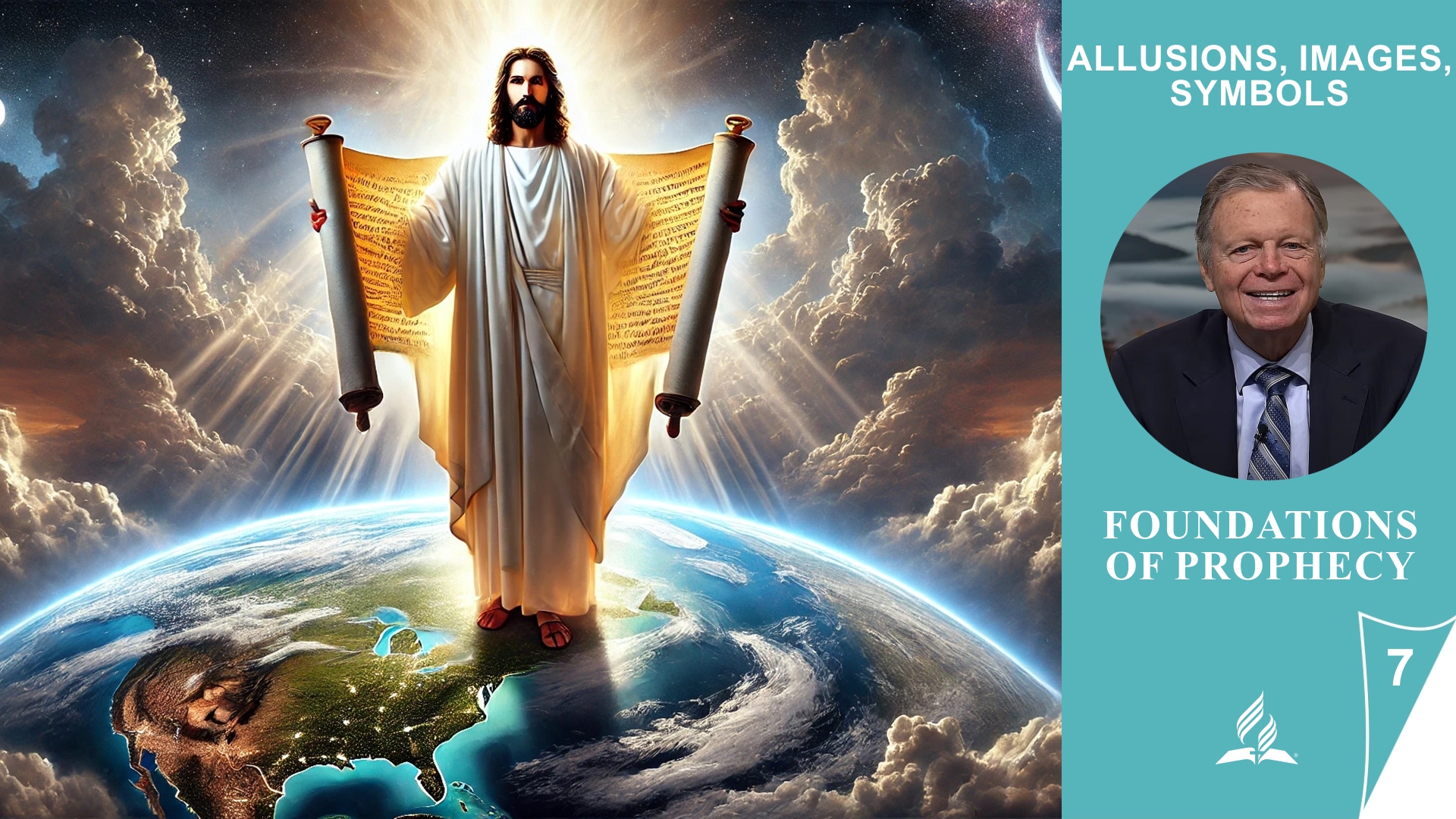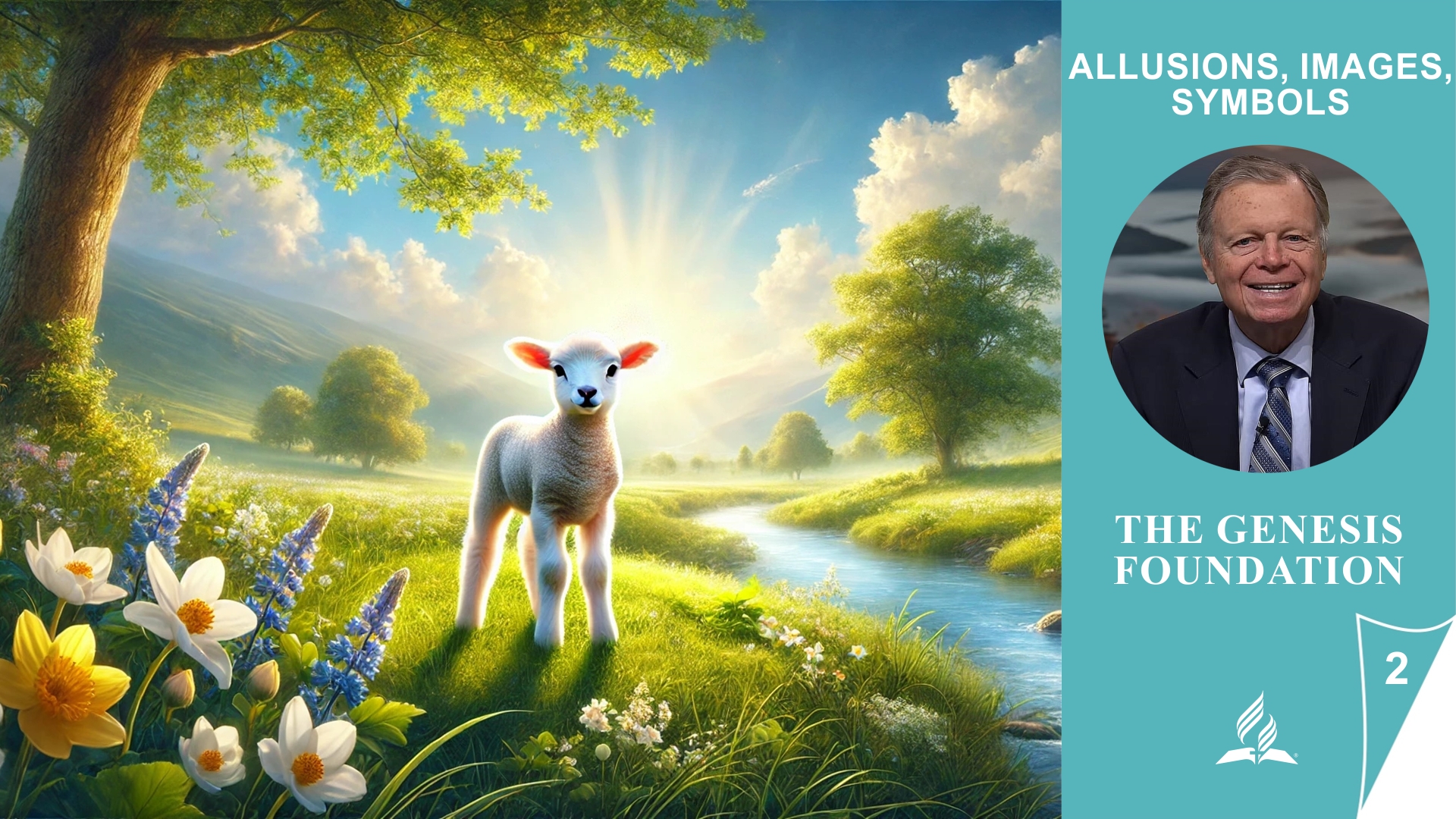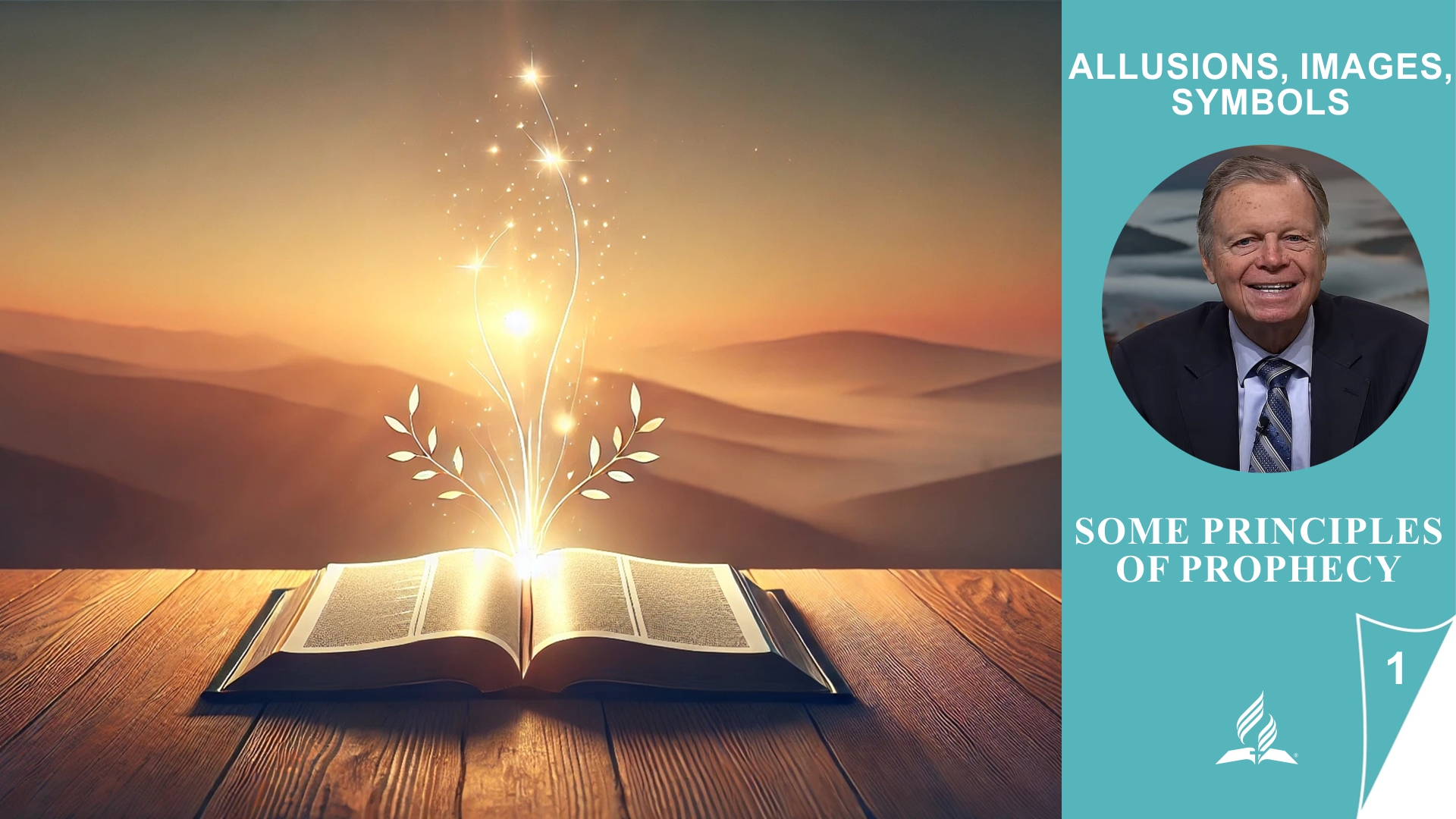
Allusions, Images, Symbols – Lesson 7.Foundations of Prophecy | Sabbath School with Pastor Mark Finley

Series ALLUSIONS, IMAGES, SYMBOLS with Pastor Mark Finley |
Lesson 7.Foundations of Prophecy |
The Glory of God and the Call to Proclaim – A Glimpse Behind the Veil of Eternity |
Lesson 7 takes us deep into the heart of biblical prophecy—not merely as foretelling the future, but as an encounter with the living God. When God reveals Himself, it is not primarily to convey information, but to transform hearts. The prophets of Scripture were themselves first transformed before being sent—like Isaiah, who, in the light of God’s holiness, became painfully aware of his own sinfulness. The cherubim, symbols of divine nearness and majesty, remind us that true prophecy is born out of God’s presence. In a world crowded with competing voices, this lesson invites us once more to listen to the voice that issues from the throne. For only those who have beheld God’s glory can speak of Him with credibility.
Memory Text: Isajah 6:8 – “Also I heard the voice of the Lord, saying: ‘Whom shall I send, and who will go for Us?’ Then I said, ‘Here am I! Send me’ ”
Content:
7.1 “Here I Am—Send Me!”
Cleansed, Called, Sent—Isaiah’s Response to God’s Grace
Isaiah’s call did not begin with his willingness, but with an honest encounter with God’s holiness. Confronted by divine glory, he saw his own unworthiness—a realization that humbles every human heart. Yet God did not leave him in the dust of his sin: a burning coal touched his lips, cleansing him and equipping him for service. This forgiveness changed everything—from a reluctant bystander into a volunteer. His famous words, “Here am I; send me!” show that true calling is only possible once the heart has been purified. Likewise, through Christ’s grace we too can boldly say “Yes” to God’s call in the world.
7.2 The Two Cherubim
The Cherubim at Eden’s Gate—Guardians of Life, Signs of Hope
The two cherubim stationed at the entrance to the Garden of Eden were not only guardians but also a prophetic symbol of hope. Placed at the eastern gate and suffused with divine glory, they recall God’s presence above the mercy seat, flanked by cherubim in the tabernacle. Although they barred access to the Tree of Life, they also held out a promise: the way back to God was not lost forever. Even in the expulsion lay the promise of redemption—made visible by the light between the cherubim. These heavenly beings announce not only judgment but also grace, pointing forward to Christ, who by His sacrifice would reopen the path to paradise.
7.3 Like Burning Coals of Fire
Fire, Wings, and Glory—A Vision of God’s Throne
The cherubim—mysterious creatures of light and motion—are always depicted in Scripture as close to God’s throne. In Ezekiel’s vision they burn like coals of fire, revealing God’s overwhelming majesty even in the midst of Babylonian exile. Despite the darkness of their situation, this scene reminds us that God’s rule remains supreme—even amid chaos. Parallels in Isaiah and John show that God’s holiness is unchanging, His presence both awe-inspiring and comforting. When we stand before this holiness, we recognize our own fragility—and our desperate need for grace. The cherubim remind us that God is both just and merciful, and that His glory does not abandon His people, even in exile.
7.4 God Among His People
God at the Center—from the Wilderness to Eternity
The layout of Israel’s camp around the tabernacle was no accident, but a divine message: God intended to dwell in the very center of His people. Each tribe had its place surrounding the sanctuary—ordered, connected, and meaningful. Rabbinic tradition assigns each tribe a symbolic image (lion, man, ox, eagle), echoing the four living creatures of Ezekiel and Revelation—as if heaven itself were foreshadowed in the wilderness. This pattern extends to the New Jerusalem, where God again dwells at the center and His people gather around Him. Today, God still calls us to place Him at the center of our lives. Intimacy with Him is not created by geographical arrangement but by devotion, worship, and genuine community.
7.5 The Fall of Lucifer
From Throne to Fall—Lucifer’s Pride and Christ’s Victory
Lucifer’s fall is among the greatest tragedies of creation. Once a covering cherub in God’s immediate presence, he fell into rebellion through pride and self-exaltation. Ezekiel and Isaiah portray this descent as a shift from light to darkness, from praise to accusation. In stark contrast, Revelation 14 shows the redeemed, saved by the Lamb’s blood, standing on Mount Zion—where Lucifer once stood. God’s grace is so vast that fallen humanity is not only forgiven but also appointed heirs—filling the gap left by the fallen angels. This grace compels us: our task is to carry this gospel to all nations with clarity, humility, and passion.
7.6 Summary
When Heaven Touches Earth—God’s Voice in Prophecy
Lesson 7 has explored the prophetic foundations that testify to God’s nearness, holiness, and love. From Isaiah’s call we see that true prophecy always springs from an encounter with God’s glory and the experience of forgiveness. The cherubim—guardians of the sanctuary and symbols of divine presence—thread through all biblical prophecy, pointing to God’s desire to dwell among His people. From Eden to Revelation, we learn: God reveals Himself to save, not to destroy. Lucifer’s fall warns us where pride leads, while the redeemed are called back to the throne by the Lamb. Prophecy is not an end in itself but God’s invitation to hear His voice—and to follow.
Allusions, Images, Symbols – Lesson 5.The Nations: Part 2 | Sabbath School with Pastor Mark Finley
 Series: ALLUSIONS, IMAGES, SYMBOLS
Series: ALLUSIONS, IMAGES, SYMBOLS
 With Pastor Mark Finley
With Pastor Mark Finley
Lesson 5:  The Nations, Part 2
The Nations, Part 2
 God’s Sovereignty over the Kingdoms of the Earth
God’s Sovereignty over the Kingdoms of the Earth
 Introduction
Introduction
The history of the world is not a chaotic game of powers – it is the stage on which God’s eternal plan unfolds. In this lesson, we see how human kingdoms fade away, while God’s kingdom stands on an everlasting foundation. From the fall of Babylon to the emergence of God’s final people, prophecy shows us that God’s will prevails despite turmoil and upheavals. Trusting in His Word, we discover hope beyond all uncertainties.
 Memory Text:
Memory Text:
“Be still, and know that I am God; I will be exalted among the nations, I will be exalted in the earth!”
— Psalm 46:10
 Content:
Content:
 5.1 The Very First Commandment
5.1 The Very First Commandment
 Humanity’s First Test of Obedience
Humanity’s First Test of Obedience
In the Garden of Eden, God not only granted freedom but also set a clear boundary – out of love. The command not to eat from the Tree of Knowledge was meant to protect, not restrict. Even today, we face decisions about whom we listen to in the “garden” of our lives.
 5.2 Daniel 2
5.2 Daniel 2
 From Gold to Ashes—God’s Kingdom Endures
From Gold to Ashes—God’s Kingdom Endures
The statue made of gold, silver, bronze, and iron reveals the decline of human kingdoms. Despite all human achievements, the world remains filled with conflict. Yet at the end stands the “stone cut without hands” — a symbol of God’s eternal kingdom — replacing all earthly powers.
 5.3 Daniel 7
5.3 Daniel 7
 Tumultuous Seas and the Unshakable Kingdom of God
Tumultuous Seas and the Unshakable Kingdom of God
Monstrous beasts rise from stormy waters — a vivid image of human violence and chaos. In the midst of it all, God calls us to hope in His eternal, just kingdom rather than earthly rulers.
 5.4 Between Land and Sea
5.4 Between Land and Sea
 Land of Hope, Sea of Turmoil
Land of Hope, Sea of Turmoil
Land symbolizes divine stability, while the sea represents human unrest. In Revelation 12–13, we see God’s people finding refuge — yet prophecy warns: even apparent havens can change. Only those who trust in God remain truly secure.
 5.5 Prophesy Again
5.5 Prophesy Again
 The Final Message to a Dying World
The Final Message to a Dying World
The remnant church receives the call to “prophesy again,” warning the world and preparing it for Christ’s soon-coming kingdom. Both land and sea will bear witness that God’s light pierces the darkness.
 5.6 Summary
5.6 Summary
 God’s Plan Amid the Kingdoms of This World
God’s Plan Amid the Kingdoms of This World
From Eden to the end times, prophecy shows us: human kingdoms falter, but God’s plan stands firm. Rather than relying on earthly securities, God calls us to be bold, faithful witnesses of His coming kingdom — full of courage and hope.
Allusions, Images, Symbols – Lesson 2.The Genesis Foundation | Sabbath School with Pastor Mark Finley

Series ALLUSIONS, IMAGES, SYMBOLS with Pastor Mark Finley |
Lesson 2.The Genesis Foundation |
The Roots of Truth – Why the Beginning Matters |
Lesson 2 takes us back to the beginning of the Bible, where many decisive truths are revealed for the first time. In Genesis, God lays the foundation for central spiritual concepts such as love, sacrifice, death, and redemption. These first mentions help us to better understand the depth and continuity of biblical teachings. Particularly for the study of prophecy, it is important to know the original meanings of these themes. The Bible does not begin with Genesis by chance – it begins where God’s great plan becomes visible. Whoever understands this beginning can better follow the red thread of the redemption story all the way to Revelation.
Memory Text: John 1,29 – “The next day John saw Jesus coming toward him, and said, ‘Behold! The Lamb of God who takes away the sin of the world!’ ”
Content:
2.1 The Principle of “First Mention”
The Origin of Truth: Why the Beginning Matters
The principle of “first mention” emphasizes that fundamental biblical truths are introduced already in Genesis and unfold throughout the entire Bible. These early passages serve as keys to understanding later biblical teachings and prophecies. The truths revealed by God do not change over time but are deepened and expanded through repeated emphasis. In a world where truth is often seen as relative, this principle offers a firm foundation for spiritual growth. It reminds us how important it is to take the Bible as an infallible source of divine truth seriously. Subtle attacks on this foundation can occur through philosophical trends or seemingly “new insights” that seek to lead us away from biblical truth.
2.2 Understanding God’s Love
Divine Love: More Than a Feeling – A Selfless Devotion
Understanding God’s love means growing beyond our egocentric perspective and recognizing the essence of true, self-sacrificing love. In Genesis 22, we encounter the first biblical mention of “love” in connection with Abraham’s willingness to sacrifice his beloved son. This story reflects the profound, selfless love of God, who gave His own Son for us. Such love stands in stark contrast to the modern, often self-centered understanding of love. It is neither comfortable nor romantic, but courageous, humble, and sacrificial. Only through God’s help can we begin to live out this love and pass it on to others.
2.3 Isaac’s Question: “Where is the Lamb?”
“Where is the Lamb?” – The Question That Runs Through the Bible
Isaac’s question “Where is the Lamb?” runs like a red thread through the entire Bible and finds its complete answer in Jesus Christ. Already in Genesis 22, God symbolically hints at the forthcoming sacrifice of His own Son. The Lamb becomes the central image of redemption, spanning from Passover through the prophets to Revelation. In John 1:29, John the Baptist points to Jesus and prophetically answers Isaac’s question: “Behold, the Lamb of God.” This Lamb is our substitute, who dies in our place – without Him, we would be subject to judgment. The assurance that Jesus intercedes for us grants hope, peace, and the foundation for our redemption.
2.4 Dealing with Death
The Enemy of Life – And the Hope Beyond Death
Death is not “part of life” but its adversary – an unnatural intruder in God’s creation. The Bible makes it clear that death is the consequence of sin, a separation from the Creator who is the sole source of life. Already in the early chapters of Genesis, it is shown how profoundly death destroys human life – and how painful its consequences are, especially in the story of Cain and Abel. Yet through Jesus Christ, the Righteous, who was unjustly killed like Abel, God confronts death with a definitive solution. Jesus’ victory over death, evidenced by His resurrection, gives us hope beyond the grave. Without this hope, our life would ultimately be aimless – but through Christ, it has received an eternal perspective.
2.5 The Serpent
The Old Serpent in New Guise – Satan’s Unchanging Tactics
The introduction of the serpent in Genesis 3 reveals Satan’s main strategy: to sow doubt about God’s word and character. This same tactic runs throughout the entire Bible up to Revelation, where the devil is once again portrayed as the deceiver of the whole world. Although societal forms and ideologies change, Satan’s goals and methods remain constant – he wants worship for himself and leads people there through deception. In today’s culture, his lies appear in new packaging: promises of godlike self-determination or the denial of eternal consequences. Christians are called to remain vigilant, firmly grounded in God’s truth, in order to see through the enemy’s masks. God’s word and character remain unchanged – that is our security in the great battle.
2.6 Summary
Back to the Beginning – Understanding the Key Themes of the Bible
Lesson 2 takes us back to the roots of faith – into the first book of the Bible, Genesis. Genesis is more than just an account of the origin of the world; it lays the foundation for central biblical themes such as love, sacrifice, death, and redemption. Many terms and symbols that play a significant role in prophecy appear here for the first time. The so-called principle of “first mention” helps us to properly classify and better understand these themes. Those who know the origins will recognize deeper connections as the Bible unfolds and can grasp God’s plan more clearly. That is why a solid understanding of Genesis is indispensable for any serious study of prophecy.
Allusions, Images, Symbols – Lesson 1.Some Principles of Prophecy | Sabbath School with Pastor Mark Finley

Series ALLUSIONS, IMAGES, SYMBOLS with Pastor Mark Finley |
Lesson 1.Some Principles of Prophecy |
Why Prophecy Is More Important Than Ever Today |
Biblical prophecy both fascinates and confuses—it raises questions while also offering answers full of hope. In the midst of many interpretations and opinions, this lesson reminds us that God desires to speak clearly through prophecy. It is not a book of riddles for experts, but a love letter from God to humanity pointing us to Jesus. Yet, to understand it properly, we must be willing to let the Bible teach us. This lesson introduces fundamental principles that help us distinguish between symbolism and literal language. Those who engage with it will come to see that prophecy is God’s way of preparing us for what is to come—and for the One who is coming.
Memory Text: Jeremiah 9:24 – “ ‘But let him who glories glory in this, that he understands and knows Me, that I am the Lord, exercising lovingkindness, judgment, and righteousness in the earth. For in these I delight,’ says the Lord.”
Content:
1.1 Whoever Reads, Let Him Understand
A Call to Attentive Listening and Humble Understanding
In a world full of conflicting interpretations, the Bible invites us to read with an open and reverent heart. God does not speak in riddles, but in a language meant to be understood by those willing to listen. The Bible is not a book of myths or a collection of moral tales, but the living Word of God. Without the guidance of the Holy Spirit and a willingness to submit to God, the true meaning often remains hidden. Those who only seek faults will hardly ever find truth—because the heart plays a central role in understanding. Prophecy is not meant to confuse but to reveal and bring hope.
1.2 God Wants to Be Understood
A Clear God in a Confused World
God is not a distant, silent observer—He is a speaking, loving Father who longs to be understood. Even though His thoughts far surpass our own, He reveals to us what we must know for our salvation. The Bible—especially prophecy—is a means by which God makes His plan of salvation visible. At its center is always Jesus: the Lamb of God who fulfilled ancient promises. Instead of harping on unresolved questions, God invites us to act in trust on what is clear. For those who respond to the light given to them will receive even more of it.
1.3 Daniel—Shut Up the Words
When Knowledge Blossoms at the End of Time
God commanded Daniel to seal the words because their full meaning was to be understood only at “the end of time.” This points to a special increase in understanding of the Book of Daniel itself—not merely scientific or technological progress. In contrast, Revelation was not sealed, since its message was meant to be accessible to all generations. Since the end of the 1260 prophetic years around 1798, the understanding of biblical prophecy—especially concerning Daniel—has deepened significantly. Movements such as the great Advent revival demonstrate that this prediction is being fulfilled. This insight is both a gift and a commission—a call to gratefully pass on the light.
1.4 Studying the Word
Understanding Prophecy Means Letting the Whole Bible Speak
Studying the Bible is like assembling a puzzle—only when many pieces come together does the full picture emerge. Although William Miller was not right about everything, his method of comparing Scripture with Scripture was groundbreaking. The Bible teaches us that every word counts (Matt 5:18) and that a thorough study, guided by the Holy Spirit, is necessary to discern truth (2 Tim 3:15–17). Picking out only individual verses risks receiving a distorted message—especially in prophecy. The best way to counter such misunderstandings is with patience, love, and by emphasizing the context of the entire Scripture. True understanding grows in the light of the whole biblical testimony—not from isolated snippets.
1.5 Figurative or Literal?
Divine Images with Clear Meaning
The Bible contains many symbols, especially in prophecy, yet it does not leave us in darkness about their meaning. The most reliable way to interpret them is not by our modern symbolism but by following the principle that the Bible interprets itself. For instance, we learn that horns stand for kingdoms, swords symbolize the Word of God, and women represent God’s people. God speaks in symbols to convey profound truths—and often to protect His people in times of persecution. Even if not every detail is immediately clear, our faith is strengthened when we accept with an open heart what is understandable. For what we do grasp is sufficient to recognize Jesus and trust in His Word.
1.6 Summary
Foundations for a Clear Understanding of Biblical Prophecy
Lesson 1 lays out important principles for correctly understanding biblical prophecy. The Bible invites us to read with an open and trusting heart, confident that God communicates clearly. Prophecy is not meant to confuse but to reveal the plan of salvation and bring us closer to Jesus. It is essential to study the Bible as a whole, interpret symbols within their biblical context, and view God’s Word as a unified whole. History shows that understanding of prophecy increases especially “in the last days.” Those who read the Bible in this way are taught by God—and find hope and guidance in a confusing world.
- « Previous Page
- 1
- …
- 4
- 5
- 6
- 7
- 8
- …
- 385
- Next Page »
